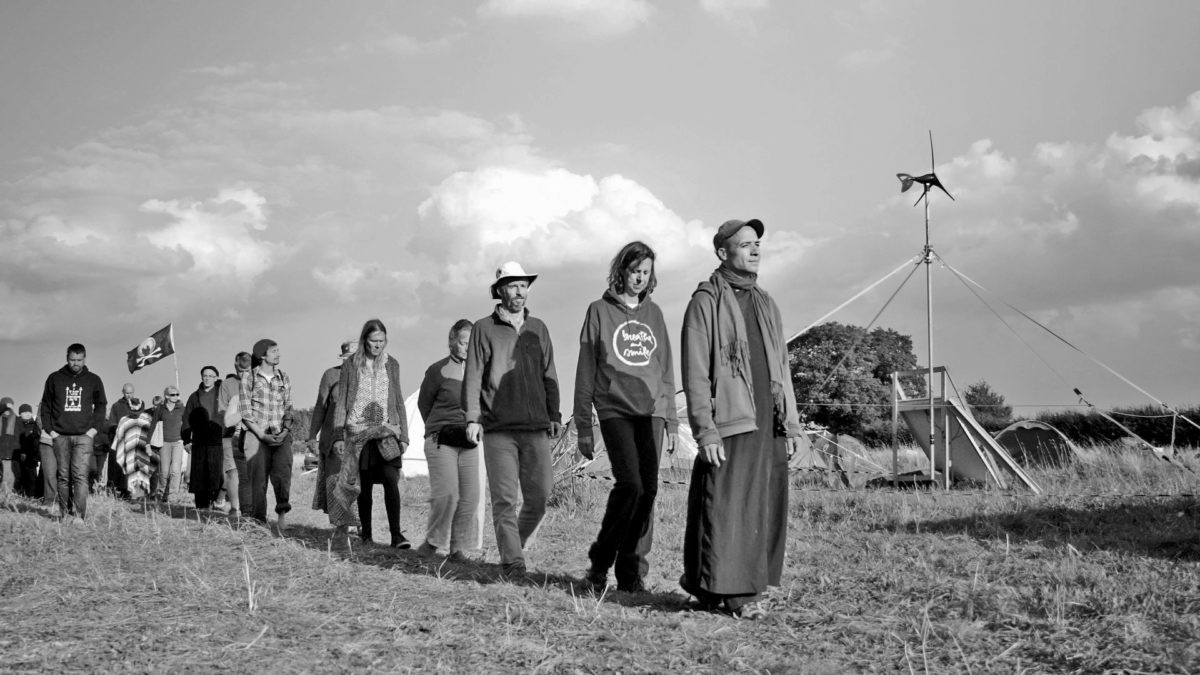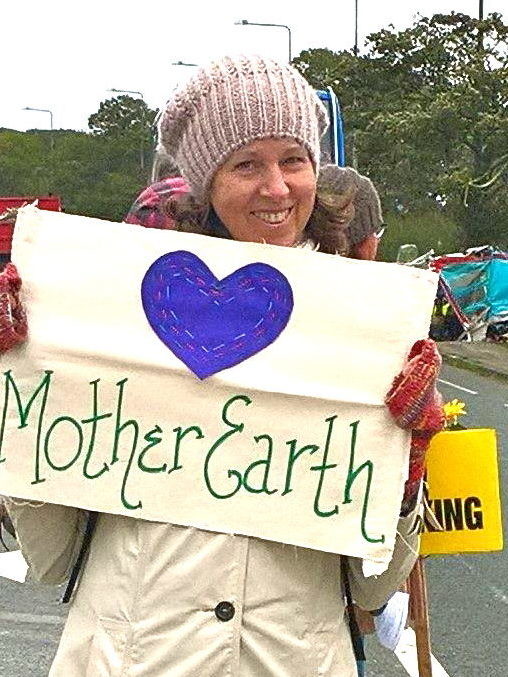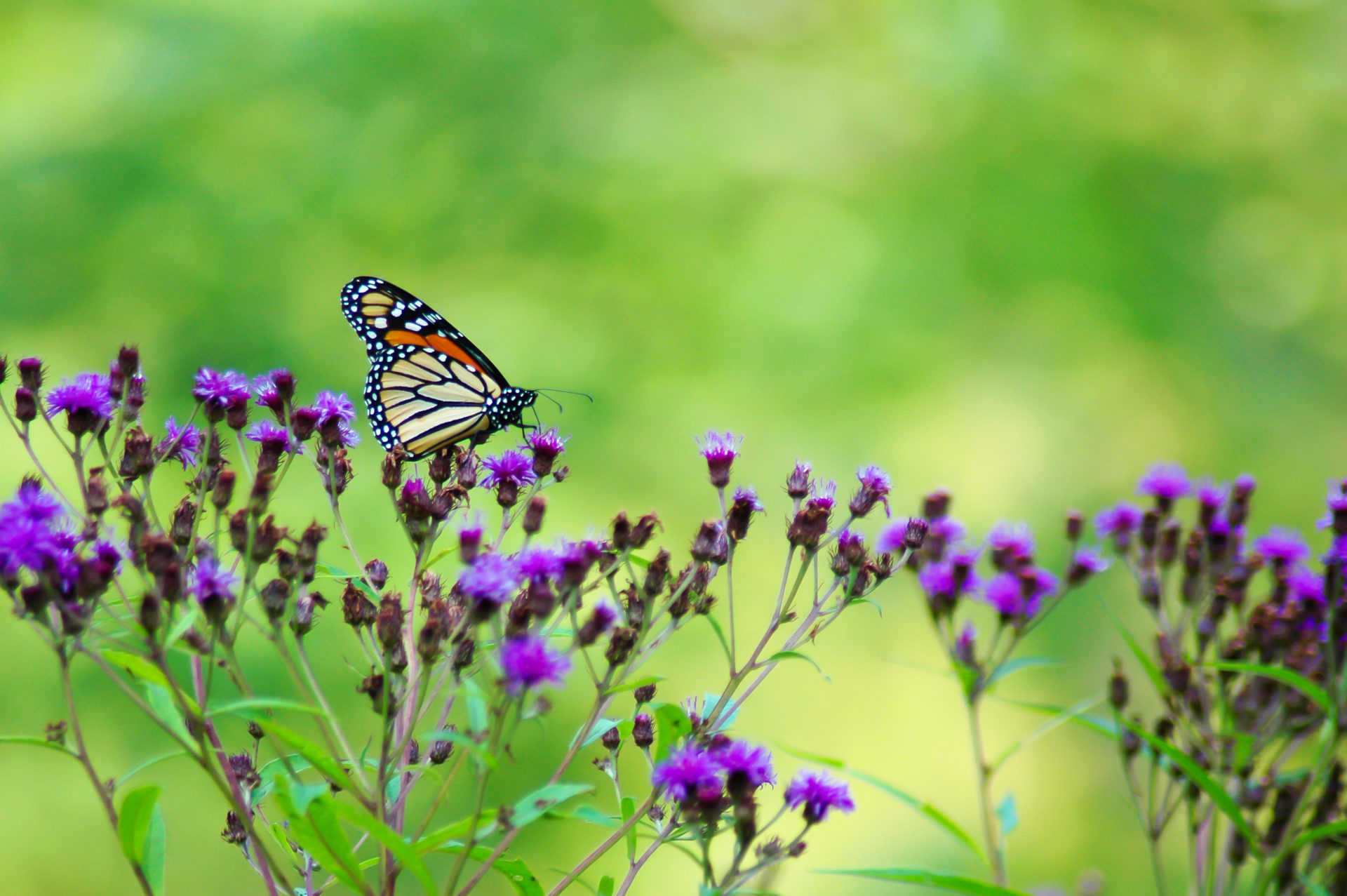By Jan Goss

In May 2017, I became an activist and visited my local fracking site near Blackpool in Lancashire, four miles from my home in neighbouring Lytham. Despite local people and councillors voting unanimously against the invasion of the fracking industry, the government imposed this fossil fuel industry on the local community and the rest of England.
By Jan Goss

In May 2017, I became an activist and visited my local fracking site near Blackpool in Lancashire, four miles from my home in neighbouring Lytham. Despite local people and councillors voting unanimously against the invasion of the fracking industry, the government imposed this fossil fuel industry on the local community and the rest of England.
Over six months I witnessed turmoil, anger, hurt, violence, despair, compassion, humour and love that went along with fracking and the stand against it. On one hand, I was encouraged by the people who felt deeply for Mother Earth, who realised our complete dependence on her and who were willing to put their bodies on the line for her. On the other hand, I despaired at the lack of understanding and violence of those who were, and still are, exploiting the Earth when many viable alternatives in the form of renewable energy sources exist.
The extent of the police presence and their strong-arm tactics—and their facilitation of this industry rather than their keeping everyone safe—shocked me. The police pushed and kettled and dragged people; elderly men and women were “rugby tackled” to the ground; young women were pulled from vehicles and thrown onto the road; a young disabled ex-naval officer was tipped from his wheelchair on numerous occasions, and an eighty-six-year-old woman was dragged across the road and left on the kerb. Near misses happened as lorries entered the site at speed for fear of a “lorry surfing” campaigner boarding their vehicle and stopping them in transit. A private security guard, unable to control his anger, restrained a peaceful Earth protector’s throat.
On my first visit on a hot sunny day in May, I found myself caught in a maelstrom of police officers and their vans, and the closure of the busy road to allow service vehicles to come and go from the site. The way some of the protestors spoke to the police with unkindness and with little or no regard for their feelings, the way the police treated the protestors with shoving and goading and the way everyone continued to exploit Mother Earth made me sad. I could see the cycle of cause and effect, one unkind behaviour prompting another.
As an instinctive response, I engaged in walking meditation under the shade of my umbrella and chanted “Namo Avalokiteshvara.” At one point I became surprised at how loud and confidently I was doing this. It was a spontaneous response to the anger and violent attitudes surrounding me. I walked and chanted in front of the police line and past their vehicles. I felt a detachment and simultaneously a deep connection, detached from the fray and connected to Mother Earth and all of our vulnerabilities. I continued for a couple of hours, managing to be present but not getting caught in the precipitating anger.
On subsequent visits, a few police officers approached me and asked what I was chanting. Others commented on my peace and one dubbed me “the world’s most peaceful protestor.” The police were mostly respectful of my practice, intrigued enough to ask me questions, and allowed me to walk in mindfulness. With effortless effort, my practice engaged those around me in more peaceful dialogue.
The summer became consumed with anti-fracking activism as I also volunteered to co-ordinate a wellbeing programme to offer to those engaged in a month-long period of intensive activism, including lock-ons (people blocked the roads in peaceful protest by locking themselves into multi-layered devices that required special cutting equipment to remove them) and “lorry surfing” campaigners who gallantly stand atop heavy goods vehicles, sometimes for days at a time. During this period, I worked with taking care of anger, being compassionate and being in touch with Mother Earth.
A women’s “call for calm” began on 19th July and is still a regular Wednesday morning event at the fracking site. Women gathered, wearing white, to walk together and stood in silence for fifteen minutes at the entrance of the site. We were encouraged to take the microphone afterwards and speak from our heart and personal experience—a “pop-up” Dharma sharing. The first week I read page eight of Thay’s book Love Letter to the Earth. Thay’s words touched the hearts of all present, including the police and security guards. People were encouraged to know that our teacher had written this book and they wanted to read it.
All of this activity was followed by an experience of burnout, accompanied by feelings of helplessness and hopelessness. On reflection, I was looking after others and not taking care of my self. I spilled into tears easily and too often. I knew I had to get into deeper contact with Mother Earth. So I had a compulsion to get away and just be in touch with the Earth, to lie on her and be embraced by her. I went to the Inner Hebrides, to the most remote place I know, where there is harmony and respect between humans, animals and the Earth—true reverence for life.
Mid-August, I borrowed a tent, garnered my supplies and spent a week wild camping. I slept as close to Mother Earth as I could be, watching her grasses blow in the wind, listening to her waves, seeing with my own eyes that the waves and the water are not separate, witnessing the impermanence of the clouds, listening to the rain against canvas, eating vegetables, watching the cows with their calves, realising there is no birth and no death. Only Mother Earth can offer this depth of healing.
I walked along the white sandy beaches and suddenly the voice in my heart said, “Mother Earth will take care of herself.” In that moment I truly let go.
Breathing in, I calm my body.
Breathing out, my body is at peace.
Breathing in, I take refuge in Mother Earth.
Breathing out, I release all my suffering to the Earth.1
Through my involvement in the anti-fracking movement, I learned about my courage and my limitations and I was reminded of the pain of burnout and the importance of healthy compassionate living. I saw humanity at its most connected and caring and I saw the worst of humanity, disconnected from self, one another and the Earth. I learned many ways to be involved and my practice makes a difference in all of its forms, whether standing at a gate, chanting and walking mindfully along the road, or sitting on my cushion at home taking care of my anger and generating love and compassion. I have learnt to pace my involvement, to realize when to act and when to withdraw, understanding that all forms of practice are engaged in some way.
1 Reprinted from Love Letter to the Earth (2013) by Thich Nhat Hanh with permission of Parallax Press, Berkeley, California, parallax.org.

Jan, True Deep Communication, enjoys practising with the Heart of Lytham Sangha, in Lancashire. She received transmission of the Five Mindfulness Trainings from Thay in 2010 and following Thay’s illness in 2014 her volition to receive the transmission of the Fourteen Mindfulness trainings blossomed fully.
Interbeing Nature
In preparation for the monastic-led retreat at the fracking site in Kirby Misperton, Yorkshire, to nurture and support the protectors in August of 2017, I wrote the following poem for Brother Phap Lai.
Thoughts on fracking, fracturing community, division, divide, descending. People reacting, unknowing. Histories ascending. Unearthing difficulties past. Touching sadness, holding. Hitting anger, Exploding. Humanity at its worst, humanity at its best. Humanity exposed; vulnerable. Cause and effect, Interbeing, touching the ocean of suffering and confusion, unconscious habit energy. Compassion required, knowing impermanence, Interbeing ocean. One affects all, all are one, flexing, flowing, Interbeing. Acknowledging, accepting, feeling, understanding, holding. Coming together, creating community. Seeing the fissures, fractures and scars. Trusting self, trusting “other” Interbeing Nature. I am you, you are me, we are Earth, Earth is us, Interbeing Nature. Let us breathe…

